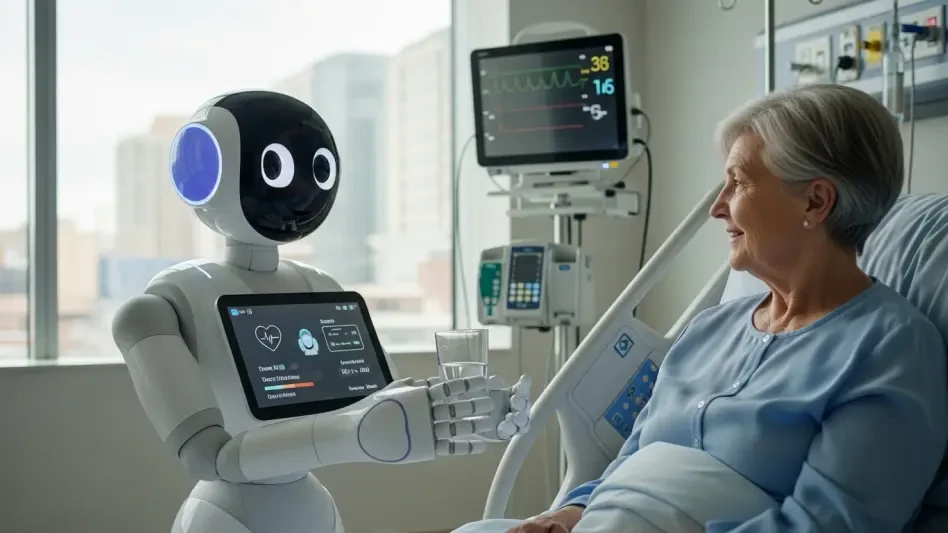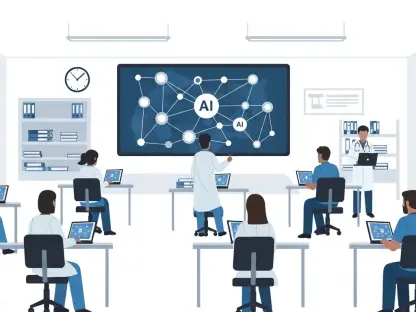What if a machine could detect a deadly disease in mere seconds, outpacing even the most experienced doctors with pinpoint accuracy, transforming the very foundation of medical practice? This scenario is no longer a distant dream but a reality unfolding in hospitals and clinics across the globe. Artificial intelligence (AI) is stepping into the world of medicine, transforming everything from diagnostics to daily administrative tasks. With the power to analyze vast datasets and uncover hidden patterns, AI is not just a tool—it’s becoming a cornerstone of modern healthcare. This feature dives deep into the profound changes AI is bringing, exploring its impact on patient outcomes, clinical efficiency, and the very essence of medical practice.
The Urgent Need for AI in Healthcare
The healthcare sector is under immense strain, grappling with aging populations, skyrocketing costs, and widespread clinician burnout. AI emerges as a critical solution, addressing these challenges with unprecedented efficiency. The global AI healthcare market has seen explosive growth in recent years, reflecting a 233% increase since early data points, and continues to expand rapidly as of 2025. More than just a financial trend, AI tackles pressing human issues—reducing errors in diagnosis, alleviating paperwork overload, and ensuring patients get care when they need it most. With over 66% of U.S. physicians now integrating AI tools into their workflows, the relevance of this technology is undeniable for anyone connected to healthcare, be it patients or providers.
This shift is not merely about adopting new gadgets; it’s about the survival and improvement of a system stretched thin. The stakes are high—misdiagnoses can cost lives, and administrative burdens steal precious time from patient care. AI offers a lifeline, promising to enhance precision and free up resources, making it a pivotal force in addressing systemic challenges. Understanding this transformation is essential as it reshapes expectations and experiences in medical settings worldwide.
AI’s Game-Changing Role in Medical Advancements
AI is making waves across various dimensions of healthcare, each area showcasing unique benefits and tangible results. In diagnostics, AI systems process enormous volumes of data to reveal insights beyond human capability. A striking example comes from Nairobi, where AI-driven tools have reduced diagnostic errors by 16% and treatment errors by 13% among 20,000 clinicians, directly improving patient safety and outcomes.
Beyond diagnostics, workflow automation stands out as a major boon. AI-powered scanners have cut down doctors’ paperwork time by 20%, while generative AI for operative reports achieves an impressive 87% accuracy rate, surpassing the 73% accuracy of manual surgeon reports. This efficiency allows medical professionals to redirect their focus toward patient interaction and complex decision-making, fundamentally altering daily operations.
Patient engagement also benefits significantly from AI innovations. Chatbots, like those developed by leading tech firms, manage routine tasks such as appointment reminders and basic health queries, easing the load on call centers and reducing operational costs. Additionally, AI is reshaping care teams by integrating new roles such as data analysts and ethicists, signaling a move toward hybrid models that blend technology with traditional expertise. These diverse applications illustrate AI’s broad potential to refine both clinical precision and administrative ease.
Real Stories from the Frontlines
The impact of AI in healthcare isn’t just in numbers—it’s in the voices of those who live it every day. Dr. Shravan Verma, a prominent healthcare innovator, notes, “AI excels at data analysis and task automation, but human empathy and judgment remain irreplaceable; they must stay at the heart of medicine.” This sentiment reflects a broader concern among professionals about maintaining a personal touch amidst technological advancements.
Surveys and symposiums reveal a mixed landscape of optimism and caution. A recent poll by a major medical association found that physicians spend nearly 5.8 hours of an eight-hour patient schedule on electronic health record tasks, a burden AI is beginning to lighten. Yet, at events like the RAISE Health symposium, 60% of Americans expressed discomfort with heavy reliance on AI in care delivery, highlighting trust as a critical barrier. On the ground, a clinician testing generative AI for documentation shared, “It’s like having an untiring assistant—notes are completed in half the time, letting me prioritize my patients.” These perspectives paint a vivid picture of AI’s promise and the ongoing need to balance it with human connection.
Charting the Path Forward for AI Integration
Adopting AI in healthcare demands practical strategies to maximize benefits while protecting trust and safety for all stakeholders. A key approach is ensuring clinician-in-the-loop systems, where AI supports rather than dictates decisions. Data from 2025 shows that 53% of hospitals using generative AI for documentation maintain human oversight, a model that preserves accountability and builds confidence in tech-driven processes.
Investment in training is equally vital, preparing medical teams for evolving roles that blend clinical skills with technical expertise. Incorporating AI ethicists and digital specialists into care teams is becoming standard practice. Furthermore, advocating for strong regulatory frameworks is essential—supporting policies like the FDA’s Software as a Medical Device Action Plan and adhering to principles of fairness and transparency can address issues like bias and consent. Lastly, prioritizing user experience design through transparent, adaptable AI interfaces, such as chatbots with clear limitations, fosters trust among users. These actionable steps form a blueprint for responsibly weaving AI into the fabric of healthcare.
Reflecting on AI’s Journey in Medicine
Looking back, the integration of AI into healthcare marked a turning point, blending cutting-edge technology with the timeless mission of saving lives. The stories of reduced errors in Nairobi, the relief of administrative burdens for physicians, and the cautious optimism of experts like Dr. Verma paint a complex yet hopeful picture. Each advancement, from diagnostic precision to streamlined workflows, underscores a shared goal of better patient outcomes.
As the journey unfolds, the focus shifts toward actionable progress. Healthcare systems begin prioritizing robust training for hybrid roles, ensuring that empathy remains central even as data-driven tools take hold. Stronger regulations emerge to safeguard against ethical pitfalls, while user-friendly designs help bridge the gap between innovation and trust. The path ahead calls for continued collaboration—between clinicians, policymakers, and technologists—to refine AI’s role, ensuring it amplifies human care rather than overshadows it. This ongoing commitment promises a future where technology and compassion walk hand in hand, forever changing the landscape of healing.









